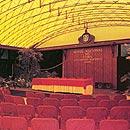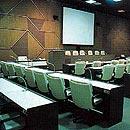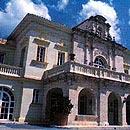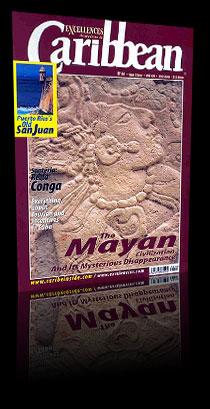Cuba’s Convention Bureau, Twenty years of creativeness and conquests
Founded back in 1982, Cuba's Convention Bureau (CCB) has spanned twenty years of toilsome work and great success as far as integration and development of all its functions are concerned. That explains why Cuban tourism minister Igrahim Ferradaz, in a recent event, underlined the outstanding role this institution has played in certifying those places fit for events and incentives across the country.
Thanks to that level of relationships, organization and discipline, CCB has made a great contribution to the strengthening of what the Cuban Minister believes is “the importance of event tourism for the diversification of sending markets and the motivations to travel to Cuba.” Mr. Ferradaz also stressed “the responsibility this particular segment has in offsetting tourists' stays and the need for the country to create its own codes on how to develop this modality.”
Last January 16, Conrado Martinez Corona took over as chairman of this major institution in which –as Mr. Corona himself puts it- “I started to know a completely different world and I grew aware of my responsibility. The State has given me a token of trust by putting me in this new post in which I'll be in charge of developing creativeness, boosting dstamina, and mapping out new actions, all of them as decisive factors as they can be.”
As to the CCB's new breakthroughs in the past twenty years, its Chairman underscores that “according to stats provided by the International Congress and Convention Association, by the end of 2001 Cuba was ranked fifth in the Americas among convention destinations, trailing only the U.S., Canada, Brazil and Mexico. As far as nationwide events are concerned, event tourism takes up around 12 percent of the country's overall leisure industry. This position –he added- means both a recognition and a challenge to the island nation.”
Asked about the trend this modality of congress and incentive tourism has been off with in 2003, Mr. Corona says “there's a considerable number of events slotted in our international schedule, more than 460. Twenty-five of those events have been assigned by major international organizations, and that accounts for a significant increase compared to past years. Some of those events I can mention to you are:
· 8th World Congress of the Orishas (July) · 6th United Nations Conference on Desertification (August) · 3rd World Congress on Law and Automation (September)
“By and large, I can say this increase has been going on a steady basis because we held 21 events in 2001; 19 in 2002 (you should take into account the aftermath of the 9/11 terrorist attacks in the U.S.). And for 2003, as I said, we'll hold 25 events. Of course, we hope to take that number one notch higher every year,” expressed an upbeat Mr. Corona.
In for offer diversification A new and interesting array of products spanning a considerable chunk of the Cuban geography was thought up and implemented last year with a view to knock together incentive travel packages. It's worth mentioning that huge effort has given rise to a more branched-out kind of product in places other than Havana and Varadero, the modality's traditional markets on the island nation. A larger presence is now seen in Villa Clara, Holguin and Camaguey, three provinces whose values bode a brighter future in this particular tourist modality. These aforesaid provinces has jacked up participation in a kind of tourism that calls for demanding creativeness, initiatives and a special type of infrastructure to both succeed and develop.
One of the premiere ends of CCB is to enhance this range of possibilities as broad as it can get in such a way that other destinations like Cienfuegos, Trinidad, Pinar del Rio, the northern keys –especially Cayo Coco and Cayo Guillermo- and Cayo Largo with its exotic charms could also become luring hubs good enough to meet the expectations of VIP groups.
Breathtaking beaches, exotic flora and wildlife, exuberant nature and genuine cultural and heritage values, among other privileges, will open up new horizons to event and incentive tourism in Cuba to make each and every trip a brand-new, different and custom-made experience.
We don't drum up anything; we trade on what we have Many areas on the island nation have just what it takes from a cultural standpoint, let alone an endless assortment of other choices highly coveted by customers, for inventive tourism. The opening of new products doesn't mean we're drumming up something new, but rather that we're taking advantage of what we have that hasn't been used so far.
CCB's chief of incentive travel, Regino Cruz, has some instances to pick from the wide variety of offers that enriches today's Cuban options: the pirates' routes in Camaguey, the smugglers' route in Granma, activities on the keys, cultural programs in several provinces developed by highly prestigious artists and groups. The richness found in Camaguey's churches or Holguin's parks could equally be considered potential elements.
With passion and enthusiasm, Mr. Cruz says When we sell an incentive package, what we're truly selling is a dream, an illusion that we make come true for tourists who once cherished that dream. It's all about trying to tap into imagination, industriousness, initiatives and creativeness to the best of our abilities and knowledge. It's all a matter of trying to generate unusual activities that could leave an unforgettable footprint in the minds of the attendants. He who had the chance of spending an entire day in a Cuban community knows for sure he'll never ever forget them. It's been centuries since the Indians were killed off in Cuba, but the detailed representation and the use of all necessary resources have helped set up this huge outdoor theater in which even translators were required to render communication between indigenous people and Spaniards.
Given these features and the principle of exclusiveness, incentive options are specifically designed for this particular modality.
Perspectives Cuba expects some 120,000 incentive trippers in 2003, yet this figure could accrue depending on its own development and the interest of the Ministry of Tourism and the Cuban government to buttress this modality.
Fast-paced growth, stability and customers' satisfaction make the future look brighter.
For the 23rd Tourism Convention Cuba 2003 The Tourism Convention will save some special room this time around to the event and incentive modality. In that respect, Mr. Corona told Caribbean Tourist Excellencies about some of the activities planned by CCB:
“Within the framework of the 2003 Tourism Convention and right after the introduction of the Holguin province, the session of May 5 will be specially devoted to Cuba as a congress and incentive travel destination. There'll be a number of lectures dictated by prominent personalities related to this tourist segment. Some of those people are:
· Mr. Rick Antonson, chairman of the Vancouver Convention Bureau and current president of the International Association of Convention and Visitor Bureaus · Mrs. Brenda Anderson, executive director of SITE (Society of Incentives and Travel Executives) · Mrs. Rebecca Coons, deputy chairwoman of Extraordinary Events USA. · Mr. Ramon Alvarez, president of G.S.A.R. Marketing and planner of the MITM Fair that took place in Merida, Yucatan.
by Daisy Aportela
(Recuadros)
Some working strategies for CCB in 2003: - Strengthen the current achievements - Step up the venue certification process - Ease the work of institutions - Continue raising CCB's role in its direct relationship with institutions linked to these tasks - Make better use of the wide database available - Help train professional planners of congresses as a key to holding successful events - Foster territorial work and the efforts of tourist circuits by urging them to join this training effort
Projections and initiatives of Cuba's Convention Bureau: - Broader use of cutting-edge technology in promoting and marketing congress and incentive travel (the Internet and online sales) - Make headway in institutional definitions on marketing and functions of the CCB and its affiliates - Foster the assignment of international events without dropping efforts to increase those labeled as part of the design itself - Work with the Ministry of Tourism to implement an official marketing policy of events and incentive travel, as well as to train more professional congress planners and raise their training one notch higher at a time.
According to the International Congress and Convention Association, by the end of 2001 Cuba was ranked fifth in the Americas among convention destinations.
The island nation relies on great facilities to guarantee top-notch events give its hotel infrastructure and high-tech means those establishments are equipped with.






































































